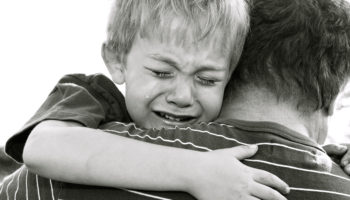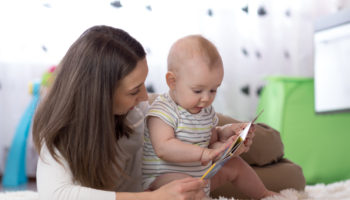Natalie Grebe
It is a typical early morning in a Pre-K classroom. Small groups of children are playing with blocks, reading books, coloring and eating breakfast. One teacher oversees the breakfast table and greets parents and children as they enter. A second teacher interacts with the children who are playing and prepares the morning activities. Most children come in bright-eyed and eager to see friends. Nearing the end of breakfast, just before the teacher rings the cleanup bell, a boy with messy hair and mismatched socks arrives. His father appears overly stressed, despite the day having just begun.
“I don’t want to!” yells the boy.
“Jack, I have to get to work,” the father says sternly.
The boy clings to dad’s pant leg and despite a few children asking, “What’s wrong, Jack?” he continues to protest his father leaving. One of the teachers approaches with a half-smile and tries to lure Jack with a new fire truck toy.
“I’m sorry,” dad says. “It’s been a tough morning. Is there any breakfast left? He hasn’t eaten.”
“Well, breakfast time is about over. I’ll have to see what’s left.”
The father is able to exit with the teacher holding a screaming Jack. She puts him at the breakfast table with a cup of milk and a granola bar, and she and her coworker exchange exasperated looks.
“How can you not feed your 4-year old by 9:00?” questions one teacher.
The other replied, “I just hope he calms down soon and doesn’t have another one of his days.”
What these teachers do not know is what has been going on in Jack’s home over the past year. Jack’s mother has been diagnosed with cancer and has been in and out of the hospital, seeking treatment. Jack’s father has taken on the role of primary caregiver, not just for their three children, but now for his wife as well. As Jack’s mom is unable to work, the family has had to adjust to living on one income. While extended family and neighbors have offered help, it is sporadic and simply not the same as having two parents running the household.
Many of these details are private and do not need to be known by the teachers at Jack’s preschool. But unaware of the situation in the home, they may become judgmental and quick to react. It is important for teachers, although not privy to information about a child’s home life, to be considerate of all children’s emotions. As adults we often hear, “Don’t judge others until you’ve walked in their shoes.” This can certainly apply to children, whether they are dealing with a chronically ill parent, loss of a pet or family member, an abusive home or anything that may cause their emotions to spin out of control. Children are still learning about their emotions and learning to recognize that they are normal. They must be taught how to handle those emotions when they become extreme.
In his June 2015 blog, “Helping children cope when a parent is sick,” Dr. Paul Schoenfeld states, “For kids, these periods of parental illness or incapacity can be unsettling. Younger children are often confused and frightened when a parent is ill. In their eyes, adults are still all-knowing and all-powerful. Children may express their fear by developing sleeping problems, wetting their bed, regressing to a younger age, or by behaving badly.”
Consider how Jack’s day in Pre-K might go if a different approach had been taken by the teacher.
“Hi Jack! It’s great to see you today,” says teacher one with a huge smile. “How about a high five, then we’ll get some breakfast?”
If Jack continues his protest, teacher one continues, “Did you tell Dad about the squirrels we saw playing outside yesterday? Let’s go look out the window and see if we can find them again.”
In this scenario, Jack’s father is put at ease that his son will be in caring hands. Jack is distracted from his meltdown and can ease into the classroom routines. Dr. Schoenfeld goes on to say parents (and teachers) can “help younger children verbalize their fears and anxieties.” Perhaps at quiet time later in the day, the teacher can use the opportunity to follow up with Jack.
“You were sad this morning and didn’t want daddy to go to work, right Jack?”
“Yeah.”
“It’s ok that you were feeling sad. Everyone feels sad at times, even grown-ups. I hope you know that Pre-K is a happy place where you can laugh and play. While daddy goes to work, you get to learn and have fun, right?”
Through this conversation, Jack can feel reassured that there are many adults who care for him and he can feel secure at school.
Social and emotional skills are so vital to a young child’s development. Teachers must recognize that teaching these skills is just as critical as ABC’s and 123’s. As a recent Kids Health from Nemours article on emotions and behaviors states, you can help kids cope with stress by encouraging “proper rest and good nutrition…make time for your kids each day…make yourself available. Don’t try to make them talk, even if you know what they’re worried about. Sometimes kids just feel better when you spend time with them on fun activities.” If teachers keep assumptions about families’ private lives at bay, they can focus on the emotional well-being of the child.
It is important that we give children the same respect we should be giving adults. Use moments like the tough morning drop off or behavior outbursts as learning opportunities, and assist children in recognizing and managing their feelings. While we don’t always know what someone else is going through in their personal life, a warm smile, a few extra kind words or a little extra one-on-one playtime with the teacher can go a long way in making them feel valued.
For more information on helping children cope with their emotions, visit these sites:
Helping children cope when a parent is sick
Helping young children identify and express emotions
References:
Schoenfeld, P., Dr. (2015, June 11). Helping children cope when a parent is sick. Retrieved from http://everettclinic.com/blog/helping-children-cope-when-parent-sick
Dowshen, S. (Ed.). (2015, February). Childhood Stress. Retrieved from http://kidshealth.org/en/parents/stress.html?WT.ac=ctg#catfeelings




